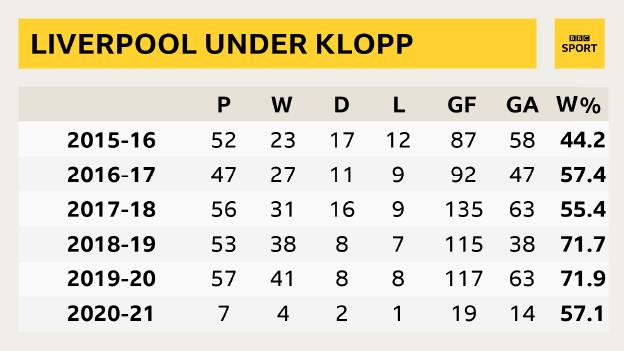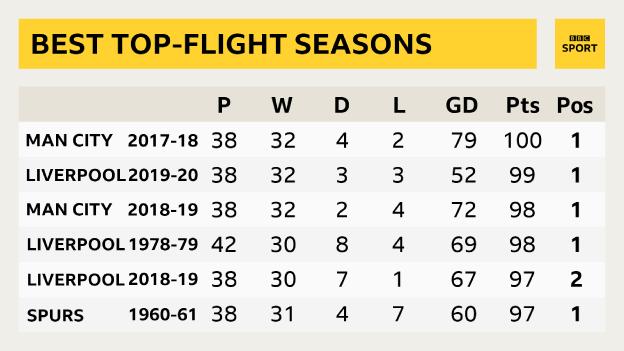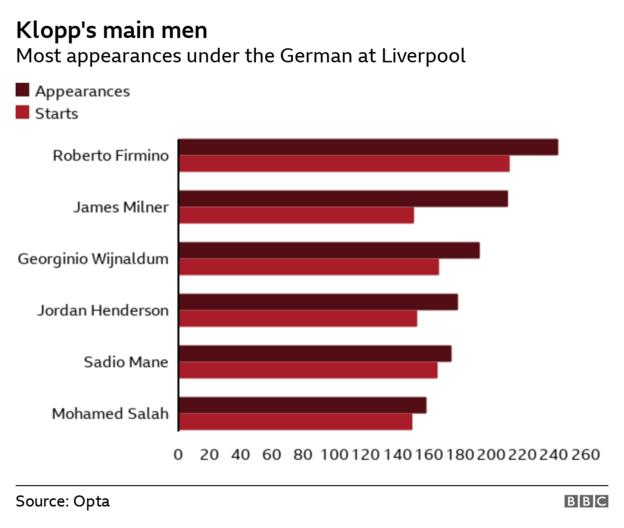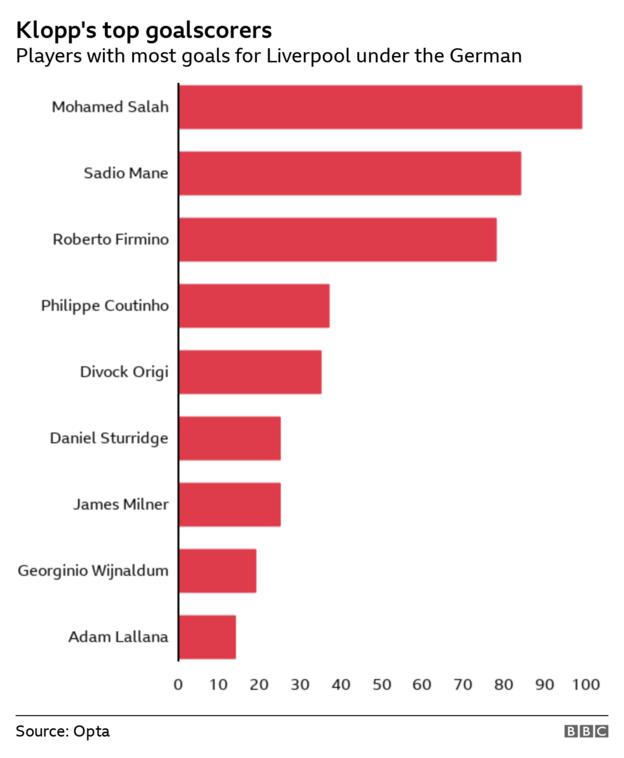Jurgen Klopp's record-breaking five Liverpool years in numbers
Last updated on .From the section Liverpool
In his first news conference as Liverpool manager, Jurgen Klopp posed a rhetorical question, intended to be self-deprecating: "Does anyone in this room think that I can do wonders?"
Five years on, we have our answer.
In half a decade of continual improvement at the Reds, the German has won trophies, broken records, restored the club to the top of the English game, inspired a city and more. Not bad for a "normal guy from the Black Forest".
Having just celebrated the fifth anniversary of his arrival at Anfield, BBC Sport looks at some of the stunning numbers underpinning Klopp's remarkable reign.
Getting better and better
On his first day as Liverpool boss, in October 2015, Klopp spoke of the need to turn "doubters into believers". Over the course of 272 matches and 164 wins, he has done just that.
Every season of the German's tenure has seen an improvement on the one before, with each campaign yielding an increasing number of victories and witnessing a win percentage that has risen from 44.2% in 2015-16 to 71.9% in 2019-20.

"I don't compare myself with the geniuses within the history of Liverpool," said Klopp at that maiden Reds news conference. "None of these managers said they wanted to be a legend when they arrived."
Bill Shankly, Bob Paisley, Joe Fagan, Kenny Dalglish - these are just some of the names to whom Klopp was referring.
The German has some way to go yet before he matches the trophy haul of some of his predecessors (Paisley alone won 20 of them), but he has them all beaten with regards win percentage as Reds boss.

His numbers stack up against his peers in the Premier League too.
Only Manchester City's Pep Guardiola, Klopp's previous rival in Germany with whom he has been embroiled in a fascinating on-field battle in this country over the past two seasons, is averaging more points per game in the English top flight since 1992-93.

It will be satisfying to Liverpool fans to see the manager who last season restored them as England's champions slightly ahead of Sir Alex Ferguson, the man who famously revelled in having "knocked them off their perch" during his trophy-laden 27 years at Manchester United.
Record-breaking Reds
"History is the base for us. It's not allowed to take the history in the backpack."
Klopp laid out his plans to start a "new way" for Liverpool in his first dealings with the English media and he has been true to his word, in record-breaking fashion.
- From October 2019 to February 2020, the Reds won 18 consecutive league matches, a joint-record in English top-flight history
- They also won an outright record 24 straight Premier League home matches from February 2019 to July 2020
- They remain undefeated in their past 61 league games at Anfield - the third longest unbeaten home run in the English top flight by any side

Salah, Firmino, Allison and the rest
"I believe in the potential of this team. There are four or five strikers I can work with, experienced defenders, the goalkeeper is really good."
Klopp was certainly right about the potential of the side he inherited back in 2015. He has also had to add a few key pieces along the way.
The German has used 88 players during his reign, handing a debut to 58 of those, from Connor Randall in a League Cup fourth-round win over Bournemouth in October 2015 to Diogo Jota, who came on as a substitute in a 7-2 win at Lincoln in September - a game in which Konstantinos Tsimikas and Rhys Williams also made their club debuts.
The player with the most appearances is Brazilian forward Roberto Firmino (242), who has featured in 89% of Klopp's 272 games in charge.

One thing Liverpool have done consistently under Klopp is score goals, with his side averaging more than two a game in the past five years.
Of the 42 different players that have scored a competitive goal under him, there are no prizes for guessing who has the most.

The Reds' renowned front three of Salah, Firmino and Sadio Mane have scored a combined 261 goals for Liverpool under the German - that accounts for 46% of Liverpool's goals in all competitions in the past five years.
Salah and Mane were both signed by Klopp, for large fees contributing to an total overall spend of £480m during the German's tenure.
Impressively, though, and assisted in part by the record-breaking sale of Philippe Coutinho to Barcelona, Klopp has been able to construct a domestic, European and global title-winning side for a net outlay of around £115m (using figures provided by Transfermarkt).
| Klopp's most expensive Liverpool signings | |||
|---|---|---|---|
| Player | Fee | Date | From |
| Virgil van Dijk | £75m | 27/12/2017 | Southampton |
| Alisson | £53m | 19/07/2018 | Roma |
| Naby Keita | £48m | 29/08/2017 | RB Leipzig |
| Diogo Jota | £41m | 19/09/2020 | Wolves |
| Fabinho | £39m | 28/05/2018 | Monaco |

- Rap Race: Can the scene now make it big outside of London?
- Black History Month: Four must-watch films





















Comments
Join the conversation
An independent England
So thanks to klopp for lighting up English football and showing the pessimists how it should be done.
Terry LFC
KnottybackSte
What a fantastic acquisition by FSG who deserve enormous credit. Jurgen has transformed this club back to a winning machine like the 1970’s & 80’s.
Thank you Jurgen, thank you.
YNWA
Formby
Wackdownunder
Lady Penelope
Show me another manager who shook the hands of every player of the opposing team to offer commiseration when they lost - Spurs in the Championship final. Winning is important but sportsmanship is just as important. His players like him, the fans adore him, even the opposition like him.
YNWA
purple wheelie bin
Noname
I and many others wonder why if you hate Anything LFC why bother coming on these threads? It’s a mystery to me!
In their day there were loads of articles on Mr Ferguson, Wenger and the not so special one.
This has been 5 wonderful years for us. Sorry for your loss.
Jonesey
jodie
rodders
Paul
chapper1
There was a piece on GMB earlier, where they interviewed an 11 year old who'd written to Klopp asking him how he should get over his anxiety of new school etc....
Klopp replied personally, utter class.
scbarhj2
as for klopp being a magnificent sportsman well we will see what a sportsman he is if he ever looses in an important game.
andyw
Beaconsfield Blade
citykev28
ted77
Abzal
All successful teams have stable platforms to build on. When he came to LFC the platform was not there. Klopp built that platform and now he's building the tower!
Fergie did it at Man Utd and there's similarities between both.
Cheese And Biscuits